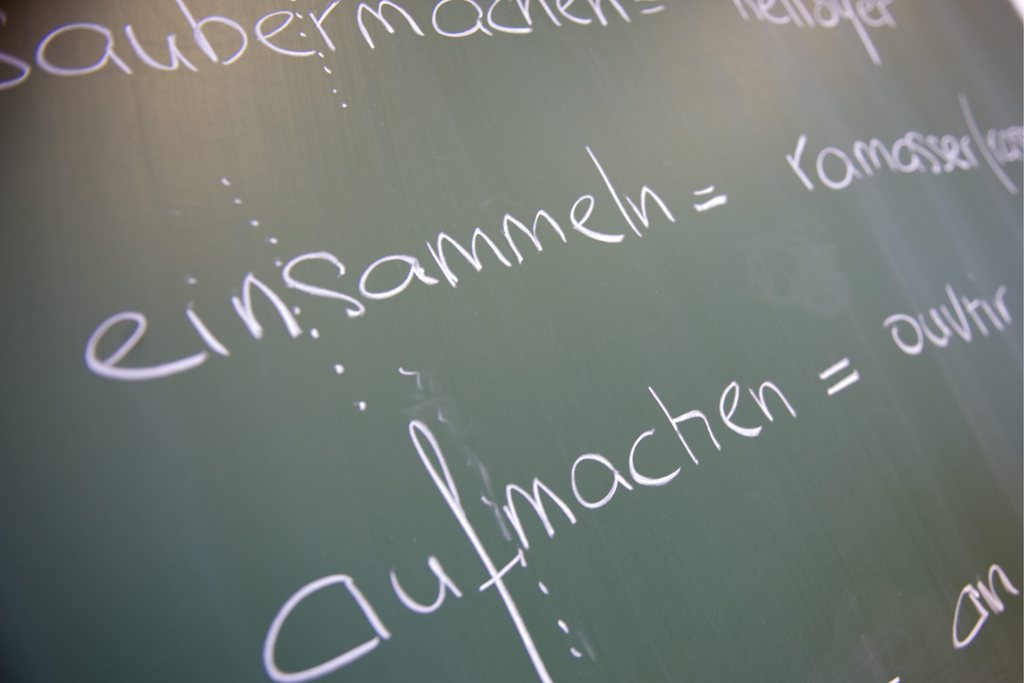Balancing national and global language needs

In a part of Switzerland where English is the working language of the many multinational companies headquartered there, only now are students being given a chance to complete some of their secondary school diploma in English.
Teenagers and parents were packed into row upon row of seats at a school hall in the French-speaking city of Lausanne recently. And still they kept coming. The draw of an English immersion programme for students was huge.
“How could they think this wasn’t going to interest more people?” one mother grumbled. On the stage, the organisers looked taken aback by the crowd.
This event, which attracted around 450 parents and first year upper secondary level students, was a presentation of a pilot education project in Vaud. The canton had said only 24 students would take part so the announcement that the number could double was greeted with applause.
The project is a French-English version of the maturité, the diploma that opens doors to university-level education.
The students selected will spend their second year in Australia, Britain or the United States. They will attend schools canton Vaud has partnered for the project and live with host families.
Alternative to French-German
A French-German bilingual programme has existed in Vaud since 1996, but until now, no other language combination has been available.
This may seem surprising in a canton that is home to numerous multinationals and international sports bodies – potential employers whose lingua franca is English.
But for Anne-Catherine Lyon, Vaud’s education minister, it was natural to introduce the French-German bilingual diploma first.
“We wanted to promote languages according to what is the logical order in Switzerland,” she told swissinfo.ch
“The French-German diploma has been hugely successful and is well established. To me, it made sense to explore the possibility of a French-English diploma, without neglecting German, and to go in the direction of promoting languages generally.”
The “logical order” for teaching languages has been the subject of a long-running debate.
Learning another national language in a country with four is generally considered to be vital to Switzerland’s socio-economic and cultural cohesion.
By the 1990s, all 26 cantons had followed recommendations from the Swiss Conference of Cantonal Ministers of Education (EDK) to introduce a second national language at primary level.
But since 2001, English – which made its appearance in secondary schools at around the same time – has gradually taken over as the second language at primary schools in the majority of Swiss-German-speaking cantons.
Young people who go on to study for a secondary diploma – bilingual or not – study two languages as core subjects, including a national language.
Students following a bilingual programme like the new French-English one must clock up at least 800 periods of study of non-language subjects in their second language. They also write their personal project, which is compulsory for all students, in that language.
“It is a more interesting way of teaching languages – there is no decontextualisation and more of a connection with current events,” said Daniel Elmiger, a senior lecturer in Geneva University’s department of German language and literature. His research has included a study on Switzerland’s bilingual diploma and he believes the concept is good.
Role of English?
Elmiger said the number of bilingual programmes has increased rapidly since 2010, when 10% of high school students graduated with a bilingual secondary level diploma. He believes the figure now could be as high as 20%.
“In the history of the bilingual diploma, English was considered an exception – the idea was to favour national languages,” Elmiger said.
“English is not the lingua franca in Switzerland and in the Swiss labour market, German is more important than English.”
Figures from the Federal Statistical Office show that in 2012, Swiss-German was the most spoken language at work (66.2%), followed by German (32.%) and French (29.1%). Only 17.7% spoke English in the workplace and 8.7 per cent Italian.
Yet a study published by the University of Bern in 2008 revealed that 86% of the population thought English was the most useful language, even though it was not the most spoken second language in any canton.
Tibère Adler, director of the Swiss-French section of the think tank Avenir Suisse, said not speaking English was a handicap in the labour market.
“Companies must export because the Swiss market is too small,” he told swissinfo.ch. “Switzerland is very open to globalisation, which explains its prosperity. English is the lingua franca and almost a must for companies active internationally.”
Adler believes other languages are a big plus. “People who don’t have incredible qualifications but who speak several languages well can be very successful,” he said. “For example, Russian, Chinese, Spanish and more unusual languages open many possibilities.”
Immersion method
Speaking of Switzerland’s system of language teaching, Adler said: “The general feeling is that results are weak and disappointing. People who study German for years can barely order a meal when they finish their secondary school diploma. That is a real problem and not only in Switzerland.”
Elmiger told swissinfo.ch that although it is more practical to buy and sell in English, individual contexts should also be taken into account. “Swiss national languages and other languages are what give the places where they are spoken their identities,” he said.
Like Adler, he believes there is room for improvement in language teaching. “I think the immersion should take place earlier, in both languages. But that requires staff,” he said. “Many people teach languages because they have to and are not at ease.”
A video of Adelaide’s long sandy beaches shown at the presentation in Lausanne gave students wishing to take part in Vaud’s pilot project an additional incentive. Thirteen schools in the Australian region have partnered with the Swiss canton.
“It’s like a dream, even if it’s going to mean working a lot,” enthused one student on her way out. Another complained that the current four hours of English per week were not enough: “The only way to learn a language properly is through immersion,” she said. “The job market is difficult and having a French-English bilingual diploma will be an enormous advantage.”
Bilingual learning
Although there a number of different language combinations in bilingual diploma programmes in Switzerland, German-English programmes are the most common, and are offered in 56 schools. In contrast, only four schools run French-English bilingual programmes.
Overall, two different types of language immersion systems are officially recognised.
In model A, students learn at least three non-language subjects in the second language at their local school. A compulsory personal project is written in the second language and counts as a subject. This can be combined with between three and 20 weeks of study in a country or Swiss region where the second language is spoken.
For Model B, students spend a year at a school in a country or Swiss region where their second language is spoken. On their return, they study at least one non-language discipline in their second language.

In compliance with the JTI standards
More: SWI swissinfo.ch certified by the Journalism Trust Initiative











You can find an overview of ongoing debates with our journalists here . Please join us!
If you want to start a conversation about a topic raised in this article or want to report factual errors, email us at english@swissinfo.ch.